Nagarjuna's Precious Garland (2015-17)
Teachings on Practical Ethics and Profound Emptiness: A Commentary on Nagarjuna's "Precious Garland".

Chapter 1: Verses 33-36
How self-grasping arises in dependence upon the aggregates and the order that selflessness of persons and phenomena are realized. Review of four point analysis.
View Post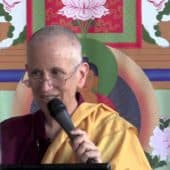
Chapter 1: Verses 36-38
Looking at the causes of rebirth in samsara, its unsatisfactory nature, and the causes for liberation.
View Post
Chapter 1: Verses 39-44
How different tenet schools posit what nirvana is, and how the Prasangika Madhyamikas refute assertions of a truly existent nirvana.
View Post
Chapter 1: Verses 45-48
Refuting inherent existence eliminates grasping at true existence and leads to liberation. Refuting inherent existence by analyzing cause and effect.
View Post
Chapter 1: Verses 49-56
Refuting the two extreme views—that things are totally nonexistent or inherently exist. Without abandoning the two extreme views liberation is not possible.
View Post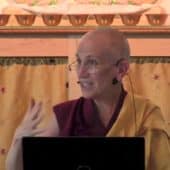
Chapter 1: Verses 57-62
To get to the view of the middle way that avoids the two extremes is very delicate and is precious. Only when you attain this…
View Post
Chapter 1: Verses 63-68
Refuting inherent existence by refuting inherent coming and going. How the impermanent, transitory person, experiences the results of karma.
View Post
Chapter 1: Verses 69-75
The different ways to understand dependent arising to refute inherent existence—dependence on parts, causal dependence, and mutual dependence.
View Post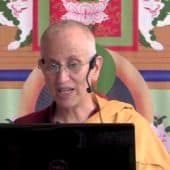
Chapter 1: Verses 76-80
How emptiness and dependent arising are mutually established, and how to posit that conventional and ultimate truths are one nature and different isolates.
View Post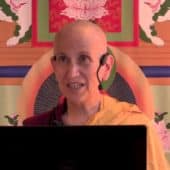
Chapter 1: Verse 80
How persons and things exist by being merely designated by conception but still exist conventionally. Differentiating between what exists and what does not.
View Post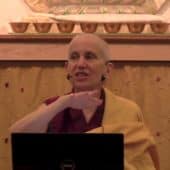
Chapter 1: Verses 81-82
Refuting an inherently existent self by analyzing the relationship between the person and the aggregates, the body and mind.
View Post
Chapter 1: Verses 82-86
Refuting the inherent existence of the person through the sevenfold analysis. Refuting the inherent existence of phenomena by analyzing the elements.
View Post